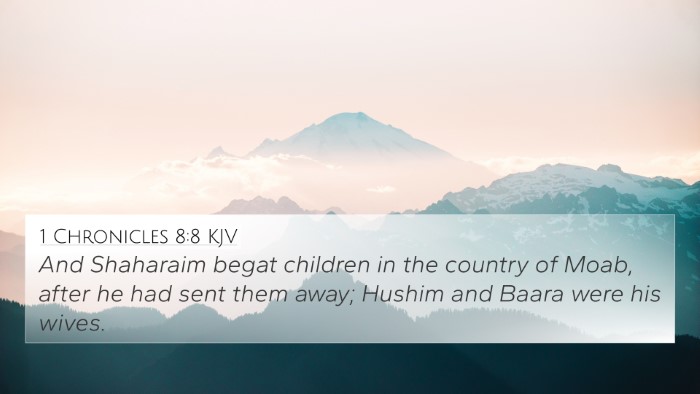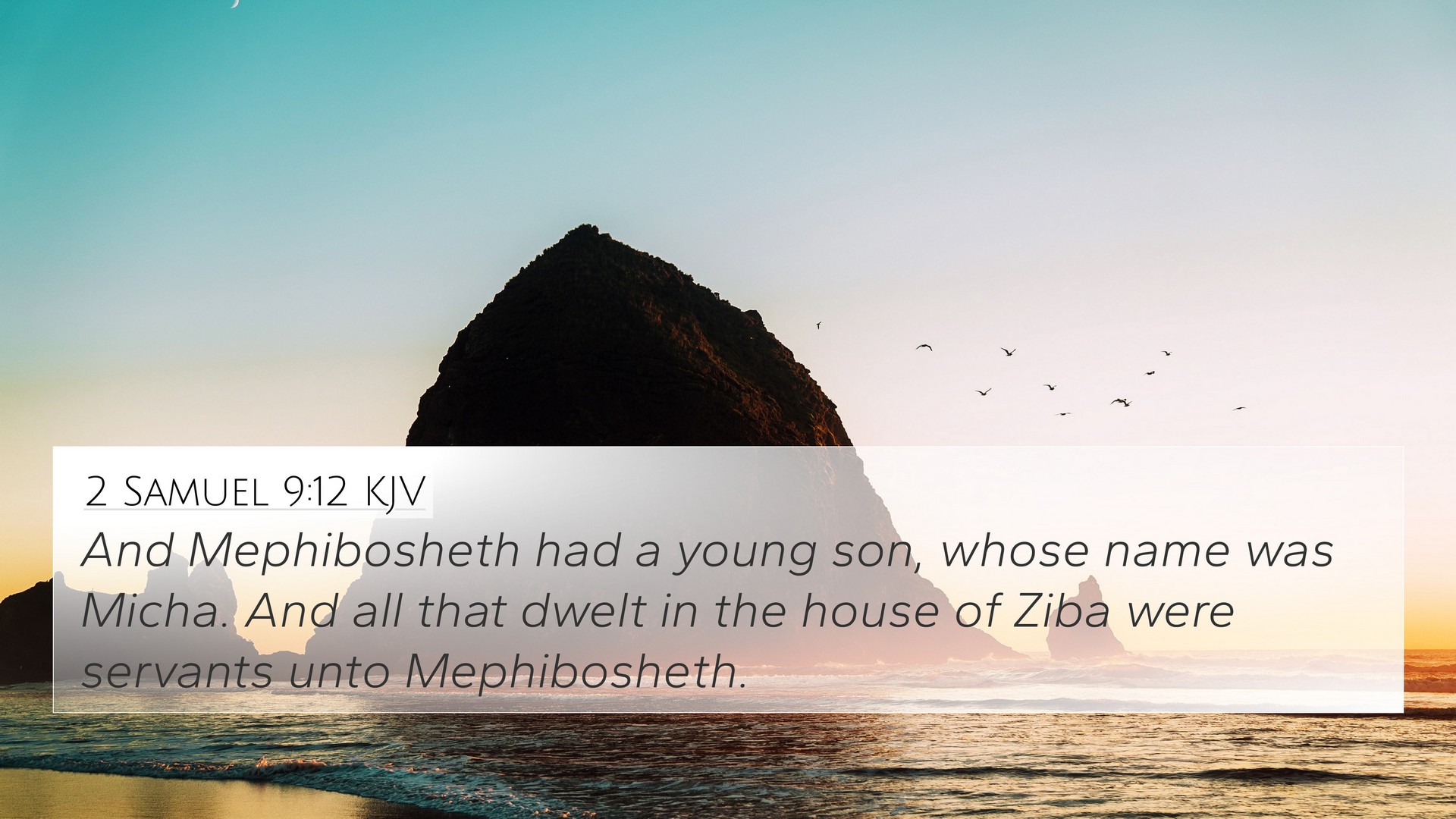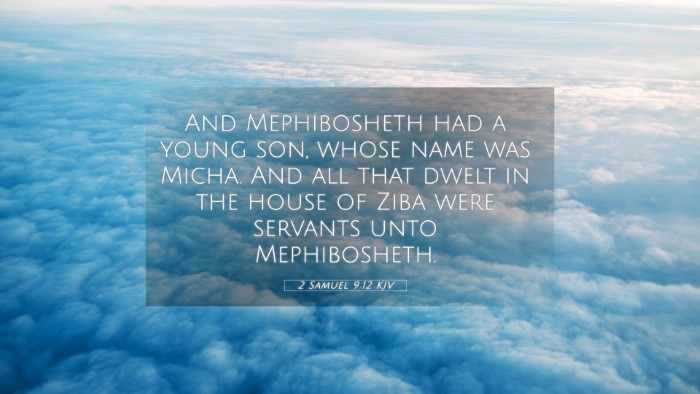Old Testament
Genesis Exodus Leviticus Numbers Deuteronomy Joshua Judges Ruth 1 Samuel 2 Samuel 1 Kings 2 Kings 1 Chronicles 2 Chronicles Ezra Nehemiah Esther Job Psalms Proverbs Ecclesiastes Song of Solomon Isaiah Jeremiah Lamentations Ezekiel Daniel Hosea Joel Amos Obadiah Jonah Micah Nahum Habakkuk Zephaniah Haggai Zechariah Malachi2 Samuel 9:12 Similar Verses
2 Samuel 9:12 Cross References
And Mephibosheth had a young son, whose name was Micha. And all that dwelt in the house of Ziba were servants unto Mephibosheth.
Uncover the Rich Themes and Topics of This Bible Verse
Listed below are the Bible themes associated with 2 Samuel 9:12. We invite you to explore each theme to gain deeper insights into the Scriptures.
2 Samuel 9:12 Cross Reference Verses
This section features a detailed cross-reference designed to enrich your understanding of the Scriptures. Below, you will find carefully selected verses that echo the themes and teachings related to 2 Samuel 9:12 KJV. Click on any image to explore detailed analyses of related Bible verses and uncover deeper theological insights.

1 Chronicles 8:8 (KJV) »
And Shaharaim begat children in the country of Moab, after he had sent them away; Hushim and Baara were his wives.

Micah 7:5 (KJV) »
Trust ye not in a friend, put ye not confidence in a guide: keep the doors of thy mouth from her that lieth in thy bosom.
2 Samuel 9:12 Verse Analysis and Similar Verses
Understanding 2 Samuel 9:12
2 Samuel 9:12 states:
"And Mephibosheth had a young son, whose name was Micah: and all that dwelt in the house of Ziba were servants unto Mephibosheth."
Overview of the Verse
This verse is a reflection of the lineage and inheritance concerning Mephibosheth, son of Jonathan and grandson of Saul. It highlights the continuation of families in Israel and signifies the loyalty that remained to King David after the demise of Saul's line.
Commentary Insights
-
Matthew Henry:
Henry emphasizes the significance of family and legacy within a covenant community. The mention of Mephibosheth's son, Micah, suggests the continuity of grace. It is a demonstration of David's kindness towards Jonathan's family reflecting God’s everlasting mercy.
-
Albert Barnes:
Barnes points to the status of Mephibosheth as both a former prince and a man who faced disability. His son, Micah, indicates the preservation of the lineage and the grace bestowed by David which upholds the noble ties between David and Jonathan.
-
Adam Clarke:
Clarke describes the socio-political implications of the verse. Mephibosheth living in the house of David despite his connection to the previous king represents a significant shift in loyalty among the tribes of Israel. He interprets Micah as a symbol of new beginnings and the fulfillment of God’s promises.
Bible Cross-References
- 1 Samuel 20:14-16: A covenant of friendship between David and Jonathan.
- 2 Samuel 4:4: Introduction of Mephibosheth himself as the son of Jonathan.
- 2 Samuel 9:1: David's inquiry about Jonathan's family, leading to his kindness.
- 2 Samuel 16:3: The fate of Mephibosheth when Ziba misrepresents him to David.
- 2 Samuel 19:24-30: The further fate of Mephibosheth concerning David’s reign.
- 2 Samuel 5:15: Overview of the effects of Saul’s family on David's kingdom.
- Romans 15:4: The significance of the Old Testament scriptures providing hope and endurance.
Thematic Connections
The theme of grace and loyalty permeates this verse, illustrating how God’s eternal promises stabilize family legacies. The foreshadowing of Christ’s grace can also be identified, as is nurturing towards those considered 'outcasts' or of lower status.
Inter-Biblical Dialogue
The connections between Mephibosheth and Jesus Christ can be drawn through the lens of grace given to those not deserving of it; similarly, the concept of being a friend of God, much like Jonathan's covenant with David, is mirrored in the New Testament's depiction of Christ’s relationship with sinners.
Applications and Reflection
This verse prompts readers to consider the importance of kindness and the keeping of promises. Mephibosheth’s narrative serves as a reminder of God’s deep-seated grace in our own lives and encourages believers to reflect on their familial legacies and how they relate to their faith.
Conclusion
2 Samuel 9:12 not only highlights the personal relationships between its characters but also serves as a testament to God’s enduring fidelity over generations. By examining this verse alongside its cross-references, we see a more extensive narrative of hope, restoration, and the fulfillment of divine promises.




